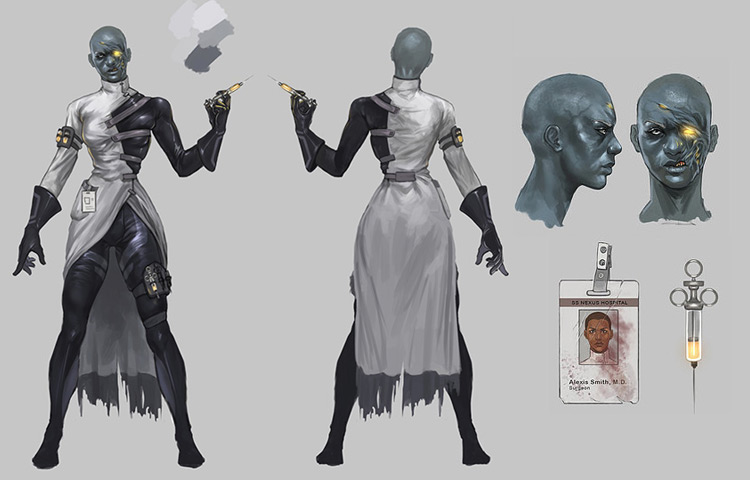Specialist or generalist? Read enough interviews with pro artists or studio recruiters and you’ll often see opposite opinions on which kind of hire is more valued by the VFX and games industries. It’s no wonder that students can become confused about which path to take, which makes it harder to realistically prepare for that dream job at a major studio. It’s easy to fall into the trap of misunderstanding these commonly used terms.

Generalist vs. specialist – what is the difference?
“Specialist” and “generalist” are terms thrown around so often in the industry that it’s easy to misunderstand what they actually mean, especially if you’re a newcomer (remember: it's never too late to start a career in VFX!).
A specialist seems simple enough to explain - it’s someone who has a single skill set that they are very, very good at. Many students assume this means being an excellent 3D modeler or an incredible FX artist. But as visual effects become more complex and studios assign hundreds of people to work on a single scene, specializing can actually mean being particularly good at modeling trains or simulating moving water.
On the other end, many students think a generalist is someone who is good at a wide range of skills. This is supported by the fact that the vast majority of film and game courses at technical colleges and universities take a generalist approach to teaching, spending most of their curriculum time introducing students to the different parts of the industry before letting them specialize in their final months.
This is great for people wanting to continue on the path of a generalist. However, this approach to teaching just doesn’t give a student enough time to get to the level of polish in their specialty that studios want to see.
"I moved from another school as CG Spectrum offered a more specific program for my needs. Let me assure you that it was the best move I have ever made. -CG Spectrum alum Danny Dore."

What are the benefits of being a specialist vs. generalist?
Benefits of being a generalist
According to Luma Pictures artist and CG Spectrum alumn Subi Asif (Spiderman: Homecoming), one of the greatest benefits of being a generalist is having an understanding of what every department does and how shots are passed down the pipeline.
"The most useful thing about a generalist is their understanding of the entire VFX pipeline. -Subi Asif"
“When working alone we don’t often consider anyone else ever using our files because we’re not passing them onto others to work with. We’re in our own bubble,” said Subi.
Having the skills of a generalist can make you a better team player while also improving efficiency, and knowing how to speed up your workflow.
“Familiarising yourself with a department you know your work will go through is a great asset as, for example, the compositing department will love you if you can get them clean exports of your FX work.”
Being a generalist doesn't mean you dabble in many parts of the VFX pipeline, it usually means you excel in more than one area, which can open up more job opportunities.
“We know some studios who want their modelers to be animators too, and their FX specialists to be able to do lighting,” says Jeff Pepper, former Lead Animator at Bardel and COO at CG Spectrum. “But you still have to be performing those different skills at an incredibly high standard. A true generalist is actually a specialist times two or three - not just someone who is so-so at everything.”

A true generalist is actually a specialist times two or three - not just someone who is so-so at everything.
It can even boil down to whether you want to work at a large, well-known studio working on blockbuster releases or a smaller upstart where you’ll have more independence.
"At a small studio, there's more demand on general knowledge. You'll get handed stuff that you don't know how to do all the time and you need to be good at either learning how to do it on the fly or being able to tap resources around the studio," says Mark Pullyblank, former VFX artist for Sony and Weta (Avatar, The Hobbit).
But ultimately, while studios may differ in the type and breadth of skills they want a hire to have, the consensus is that it’s always good to be very strong in at least one area - as it’s those skills as demonstrated in your reel that will ultimately set you apart from other candidates.

Benefits of being a specialist
Being a specialist in the animation and VFX industry means you can really hone one skill and build extensive knowledge in a certain aspect of the field. This can make you a valuable asset to a studio or team, as they know they can rely on you for expert knowledge and execution in that particular area. As a specialist, you may also get the opportunity to work on specialized projects and be involved in groundbreaking or cutting-edge work in the field.
Continuing to focus on one specific aspect of animation and VFX can allow you to constantly improve and hone your skills, leading to higher quality work and potentially increasing your rate or demand as a specialist.
"Specialization really snowballs too, once you get momentum — both in terms of your skills and your brand.” -Kyle Dahl, animator at Riot Games
There is also often less competition in niche specialized fields. And even if there is competition, having a specialty can help you stand out from other candidates or and make you more attractive to potential employers or clients because of your specific knowledge and experience. For example, if you are a highly experienced and talented creature animator, you're more likely to get the job on a film about monsters than someone who mostly animates mechanical objects or someone who is more of a generalist.
Being a specialist usually means you're likely doing exactly what you love and following your passion!
How to become a specialist?
If you want to become a specialist and pursue a particular interest in VFX and animation, you’re probably asking, how do I become that genuine specialist that studios will fight for?
First, choose a specialty as quickly as possible.
“Something I believe benefited me was an early commitment to specializing in gameplay animation,” says Kyle Dahl, an animator at Riot Games and former CG Spectrum student. “It's totally possible to keep your options open between feature, TV, VFX, and games, but I feel that if you build your skills with the goal of mastering one of them, you'll be that much better at the job and that much more valuable.
Second, make sure you’ve got the right mentor.
It’s not just who wrote the curriculum, it’s who is teaching it.
In an industry so focused on technical skills, the simple truth is you’re only as good as your mentor. So don’t be fooled by schools who advertise the big names designing their courses rather than the people actually teaching it.
“It’s not just who wrote the curriculum - though that’s definitely important - it’s who is teaching it,” says Nick Fredin, Oscar-winning animator (Rango) and co-founder of CG Spectrum. “Learning VFX is very hands-on. If you’ve got a world-class curriculum but the person teaching it hasn’t worked in a studio for ten years, how are they going to see what you’re doing wrong or push you to a far higher skill level?”
Whether you're switching careers or just starting out, when shopping for a course, take the time to meet your potential instructors or mentors and find out about their experience. The right mentor will not only help you hone your skills but give you insight into what the industry is looking for and help you find a specialty where you can really stand out.
Find the right courses to advance your skill level in the animation and VFX industry
Begin specializing with CG Spectrum's industry-focused courses. Whether you want a career in compositing, 3D modeling, 3D animation, FX, virtual production, or concept art, CG Spectrum has courses led by experts working in the industry to help you hone your skills and focus on an area you'd like to specialize in.
To find out some of the interesting and diverse areas you could specialize in within the animation and VFX industry, head to our career pathways pages.

Related Links




